Share
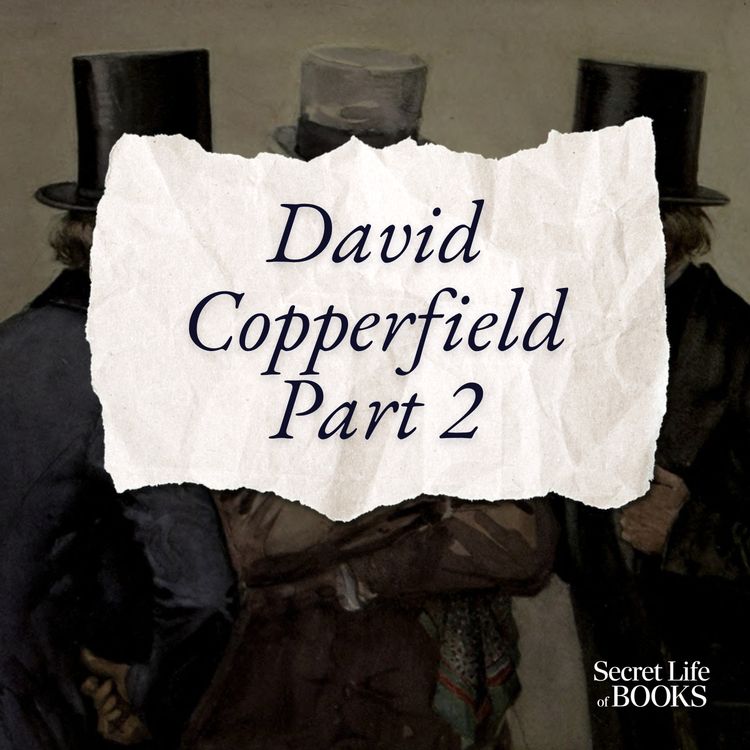
Secret Life of Books
Self-Help, dodgy marriages and the siren call of Australia: David Copperfield Part 2
In Part 2 of David Copperfield, we pick up David where we left him, sobbing at the door of Betsey Trotwood’s house in Dover. From this low, David’s life changes - he is no longer a victim, but embarks on a (very long) journey towards self-reliance, re-encountering old friends like Micawbers and Steerforth, but also new characters like Uriah Heep and the simpering Dora.
To make sense of this long, rambling journey of redemption, Sophie and Jonty reveal the influence of the emerging self-help movement on Dickens’ world-view and how his side-hustle as the director of a Home for Homeless Women inspired him to send many of the characters in David Copperfield off to Australia at the end of the book - and the inevitable happy ending this suggests.
BOOKS MENTIONED OR USED AS SOURCES:
Charles Dickens: A Life (2011) by Claire Tomalin
Self-Reliance (1841) by Ralph Waldo Emerson
Self-Help (1859) by Samuel Smiles
1848: The Revolution of the Intellectuals (1944) by Lewis Namier
Demon Copperhead (2022) by Barbara Kingsolver
Rivals (1988) by Jilly Cooper
More episodes
View all episodes
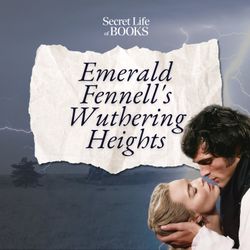
123. Emerald Fennell's "Wuthering Heights": is the hype worth it?
52:40||Ep. 123Best Valentine’s Day ever! SLOB’s “Wuthering Heights” watch-party. Sophie and Jonty take it character by character – inanimate characters included — to decide who are the winners and who are the losers in the Fennell-Robbie-Elordi mash-up adaptation of Emily Bronte’s novel. And in the episode’s gripping second half they move onto the really meaty questions: race, class, sex, domestic violence, and pets.As the movie poster says, Come Undone - with SLOB - this Valentine's season.Become a subscriber by signing up at Apple: http://apple.co/slobOr join our Patreon community here: https://www.patreon.com/c/secretlifeofbookspodcastHosted on Acast. See acast.com/privacy for more information.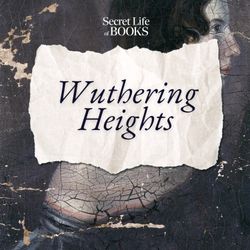
121. Wuthering Heights: Is this really the greatest love story of all time?
01:09:00||Ep. 121The storm clouds are gathering in anticipation of the Valentine’s Day release of Emerald Fennell’s raunchy film adaptation of Emily Bronte’s Wuthering Heights. The film has been described by one critic as “very horny, very sumptuous, and very demented.” Margot Robbie looks set to change the way we read this beloved classic, well, if not forever, for a few weeks during awards season.It’s fair to say that anyone remotely connected to the world of classic literature is standing by, getting ready to jeer.And it’s also fair to say that the film has propelled Wuthering Heights to become the most read classic of 2026. The New York subway, the London Tube and many other transport systems worldwide are dotted with earnest young people, proudly nose-deep in their Penguin Wuthering Heights.If SLOB has a motto, it’s be prepared. To ready our devoted listeners for the big V. Day release, we’ve recorded a brand-new episode on Wuthering Heights. Emily Bronte’s novel, which may just be the most unhinged, genre-busting, unputdownable classic in English, is back, bigger, better, and balmier than when SLOB recorded our first episode back at the very beginning of this podcast.We drink deep, but always with our trademark cheeky humor, in Emily Bronte’s biography, the secrets behind the book’s writing, and why the Heathcliff-Catherine love-story it is most definitely not GOATED, as the kids say.Become a subscriber by signing up at Apple: http://apple.co/slobOr join our Patreon community here: https://www.patreon.com/c/secretlifeofbookspodcastHosted on Acast. See acast.com/privacy for more information.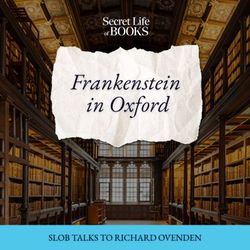
120. Frankenstein in Oxford: A Conversation with Richard Ovenden, OBE
31:36||Ep. 120Sophie talks to Richard Ovenden, OBE, the 25th Bodley’s Librarian at Oxford, about the manuscript of Frankenstein, one of the most extraordinary, and fascinating, literary treasures of all time. Richard is head of Oxford’s Bodleian, as well as the University's libraries, museums, and even botanical gardens. Though Richard isn’t personally dusting off the attic vases or planting the bulbs, he does still spend huge amounts of time with rare books and manuscripts.In this thrilling bonus episode he talks about how the Bodleian came to own the manuscript of Mary Shelley’s Frankenstein, along with the large, fascinating, and often very weird collection gathered from the Shelley family and their friends over several generations.This is an amazing behind-the-scenes look at what goes on in the world’s great libraries, why old books really matter, and why SLOB was right all along that Percy Bysshe Shelley is bad news.To see the manuscript, go to the Digital Bodleian: https://digital.bodleian.ox.ac.uk/objects/53fd0f29-d482-46e1-aa9d-37829b49987d/Become a subscriber by signing up at Apple: http://apple.co/slobOr join our Patreon community here: https://www.patreon.com/c/secretlifeofbookspodcastHosted on Acast. See acast.com/privacy for more information.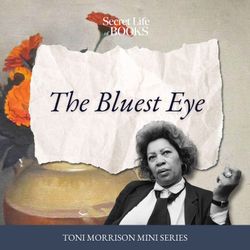
119. Toni Morrison 1: The Bluest Eye
01:09:34||Ep. 119Published in 1970, written by an unknown new writer, The Bluest Eye is the great African American novelist Toni Morrison’s debut. It remains in many ways her most radical. It’s one of the most banned books in America since its publication – for its unflinching, explicit depictions of domestic abuse, racial and sexual violence in small town America. Morrison wrote openly about Black sex and Black violence, challenging the increasingly celebratory tone of American literature in the late 1960s. Reviewing her in the New York Times, the legendary critic John Leonard recognized just how important Morrison’s voice would be. ““The Bluest Eye” is an inquiry into the reasons why beauty gets wasted in this country. The beauty in this case is black; the wasting is done by a cultural engine that seems to have been ‘designed specifically to murder possibilities,” he wrote. “She does it with a prose so precise, so faithful to speech and so charged with pain and wonder that the novel becomes poetry.” Morrison would go on to write many Modernist-inflected literary tours de force, including Song of Solomon and Beloved, and is the first and only Black woman to win the Nobel Prize for Literature. We’ll be taking deep dives into Morrison’s work across four special episodes of SLOB, for Black History Month.Become a subscriber by signing up at Apple: http://apple.co/slobOr join our Patreon community here: https://www.patreon.com/c/secretlifeofbookspodcastHosted on Acast. See acast.com/privacy for more information.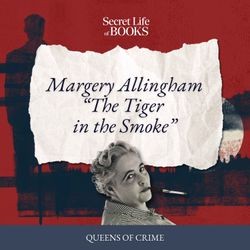
Queens of Crime 4: The Tiger in the Smoke by Margery Allingham
01:06:27|A serial killer on the loose in the foggy, battle-scarred streets of London after the Second World War. Margery Allingham's The Tiger in the Smoke (1952) is Bleak House meets 1984 meets Silence of the Lambs. In this last in the current Queens of Crime series, Sophie and Jonty looks at how Allingham - more, perhaps, than the other Queens of Crime - evolved her craft to suit the changing world around her. She dials back the importance of her aristocratic front-man sleuth Campion (who she first introduced in 1929) to focus more on the grizzled, working-class detective Charlie Luke. This book is a stepping stone out of Christieland into the world of PD James and Ruth Rendell.Become a subscriber by signing up at Apple: http://apple.co/slobOr join our Patreon community here: https://www.patreon.com/c/secretlifeofbookspodcastHosted on Acast. See acast.com/privacy for more information.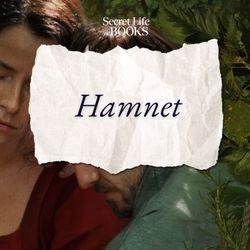
116. To See or Not to See? Hamnet tune-up session
50:07||Ep. 116With the release of Chloe Zhao's rapturously acclaimed film Hamnet, adapted from Maggie O'Farrell's much-loved 2020 novel, SLOB re-releases one of our earliest episodes.Hamnet is a beautiful, lyrical novel about Anne Hathaway, Shakespeare's wife, and the early death of their son, Hamnet. O'Farrell refocussed Shakespeare's story on the women who are usually only glimpsed at the edges of his life, reinventing Anne Hathaway as a vivacious, sexy, creative and compelling full character. In doing so she reimagines Hamlet the play as a mediation on family, love, and loss, organized around Shakespeare's wife.Our Hamnet episode itself is a historical curiosity. #18, in the earliest days of our podcast, it's officially SLOB juvenilia. We've changed and grown in the last year, and we owe everything to our listeners who tell us how it is and how it should be.Please tell us what you think about Hamnet, book or film, by jumping on our Patreon chat: https://www.patreon.com/messages/9473d46b4c7d4e59be6239f82a3e8115?mode=campaign&tab=chatsWhether you plan to see the film or not, this book has stayed in the zeitgeist ever since it was published.Become a subscriber by signing up at Apple: http://apple.co/slobOr join our Patreon community here: https://www.patreon.com/c/secretlifeofbookspodcast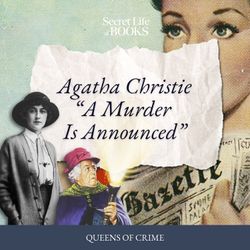
115. Queens of Crime 3: A Murder is Announced by Agatha Christie
01:07:42||Ep. 115A Murder is Announced (1950) was Agatha Christie’s 50th published book. So when better than the 50th anniversary of her death to celebrate one of her greatest works - and introduce Miss Marple into the back SLobalogue? In this third episode in our Queens of Crime series, Sophie and Jonty skip daintily from one side of the Second World War to the other to see if - and how - Agatha Christie’s plots and characters were impacted by the devastation. What we find is an England down-at-heel. Austerity. Rationing. Widespread poverty. Deserters roaming the country. Paranoia and fear of foreigners. When a murder occurs at the (still) charming village of Chipping Cleghorn, the local police are all at sea. The problem is nobody really - truly - knows their neighbours anymore and are people who they say they are? Enter Miss Marple, the Victorian relic with a mind like a sink, to put everything straight - and remind us all that Agatha Christie truly has no peer when it comes to an elegant and rollicking good crime story. Become a subscriber by signing up at Apple: http://apple.co/slobOr join our Patreon community here: https://www.patreon.com/c/secretlifeofbookspodcastHosted on Acast. See acast.com/privacy for more information.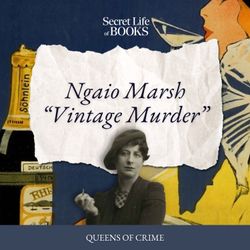
113. Queens of Crime 2: Vintage Murder by Ngaio Marsh
01:05:53||Ep. 113This week, for the second of our episodes on the Queens of Crime, we travel by steamer with Ngiao Marsh and her celebrated detective Roderick Alleyn, who decides to go on holiday in Marsh's native New Zealand — no trivial undertaking for an Englishman in the 1930s. Alleyn comes to NZ for the mountains and rivers, but stays for the bloody and highly innovative murder of a theater impressario, whose company is touring from London with the magnificent leading lady Carolyn Dacres.P.D. James, a second gen Queen of Crime herself, wrote that ‘the method of death in a Ngaio Marsh novel tends to linger in the memory.’ Much about this novel lingers in the memory, including the remarkable descriptions of New Zealand's scenery and perhaps most of all Marsh's decision to bring Maori culture and traditions to the forefront of the story. In Vintage Murder, Marsh creates a tension between three factions - the imperial mentality of the touring theater company, the colonial subservience of the New Zealand police force, and the irrepressible agency of Maori culture. And while Roderick Alleyn has everyone metaphorically sipping together at the end, those tensions remain unresolved. Vintage Murder is a great thriller AND a disturbing portrait of late British imperialism. Become a subscriber by signing up at Apple: http://apple.co/slobOr join our Patreon community here: https://www.patreon.com/c/secretlifeofbookspodcast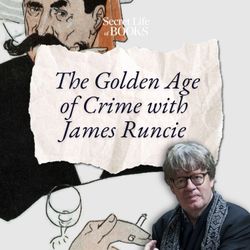
112. The Golden Age of Crime with Grantchester's James Runcie
46:44||Ep. 112James Runcie is author of the acclaimed Grantchester Mysteries - the focus of six books and a hugely successful ITV television series - following vicar-sleuth Sidney Chambers in his sleuthing career from the early 1950s to the late 1970s. James talks to Jonty about where he finds the gold in the Golden Age of Crime. In particular, Dorothy L Sayers, Agatha Christie and John Dickson Carr. He then talks about the inspiration behind the Grantchester Mysteries, which develops into a conversation about his father - who was Archbishop of Canterbury in the 1980s - and the trials and tribulations of the Church of England in the late 20th Century.The Grantchester Mysteries are:Sidney Chambers and the Shadow of Death (2012)Sidney Chambers and The Perils of the Night (2013)Sidney Chambers and The Problem of Evil (2014)Sidney Chambers and The Forgiveness of Sins (2015)Sidney Chambers and The Dangers of Temptation (2016)Sidney Chambers and the Persistence of Love (2017)The Road to Grantchester (2019)As well as discussing many books from the Golden Age, James and Jonty both enthused about David Kynaston's brilliant and ongoing 'Tales of a New Jerusalem' cycle of history books focused on Britain after the Second World War. The cycle, which started with Austerity Britain (2007), has been a big influence on Grantchester.Become a subscriber by signing up at Apple: http://apple.co/slobOr join our Patreon community here: https://www.patreon.com/c/secretlifeofbookspodcast